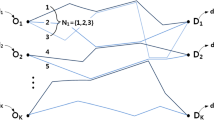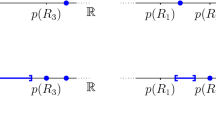Abstract
We study the implications of two solidarity conditions on the efficient location of a public good on a cycle, when agents have single-peaked, symmetric preferences. Both conditions require that when circumstances change, the agents not responsible for the change should all be affected in the same direction: either they all gain or they all loose. The first condition, population-monotonicity, applies to arrival or departure of one agent. The second, replacement-domination, applies to changes in the preferences of one agent. Unfortunately, no Pareto-efficient solution satisfies any of these properties. However, if agents’ preferred points are restricted to the vertices of a small regular polygon inscribed in the circle, solutions exist. We characterize them as a class of efficient priority rules.
Similar content being viewed by others
References
Barberà S, Jackson MO (1994) A characterization of strategy-proof social choice functions for economies with pure public goods. Soc Choice Welf 11:241–252
Ching S, Thomson W (1999) Population-monotonicity in public good economies with single-peaked preferences. Working Paper. University of Rochester. (forthcoming in Social Choice and Welfare)
Ehlers L (2002) Multiple public goods and lexicographic preferences: replacement principle. J Math Econ 37:1–15
Ehlers L (2003) Multiple public goods, lexicographic preferences, and single-plateaued preference rules. Games Econ Behav 43:1–27
Ehlers L, Klaus B (2001) Solidarity and probabilistic target rules. J Public Econ Theory 3–2:167–184
Gordon S (2006) Public decisions: solidarity and the status quo. Working paper, Université de Montréal
Gordon S (2003) Solidarity and unanimity in attribute-based domains. Working paper, Université de Montréal
Klaus B (2001) Target rules for public choice economies on tree networks and in euclidean spaces. Theory Decision 51(1):13–29
Miyagawa E (1998) Mechanisms for providing a menu of public goods: population-monotonicity. Working paper, Columbia University
Miyagawa E (2001) Locating two libraries on a street: replacement principle. Soc Choice Welf 18:527–541
Moulin H (1987) The pure compensation problem: Egalitarianism versus Laissez-Fairism. Q J Econ 102:769–783
Moulin H (1980) On strategy-proofness and single-peakedness. Public Choice 35:437–455
Schummer JP, Vohra RV (2002) Strategy-proof location on a network. J Econ Theory 104:405–428
Thomson W (1983a) The fair division of a fixed supply among a growing population. Math Oper Res 8:319–326
Thomson W (1983b) Problems of fair division and the egalitarian solution. J Econ Theory 31: 211–226
Thomson W (1993) The replacement principle in public good economies with single-peaked preferences. Econ Lett 42:31–36
Thomson W (1995) Population-monotonic allocation rules. In: Barrett W, Moulin H, Sallles M, Schofield N (eds), Social choice, welfare, and ethics. Cambridge University Press, Cambridge, pp. 79–124
Thomson W (1999a) Welfare-domination under preference-replacement: a survey and open questions. Soc Choice Welf 16:373–394
Thomson W (1999b) Population-monotonicity: a survey and open questions. Working paper, University of Rochester
Vohra RV (1999) The Replacement principle and tree structured preferences. Econ Lett 63:175–180
Author information
Authors and Affiliations
Corresponding author
Rights and permissions
About this article
Cite this article
Gordon, S. Solidarity in choosing a location on a cycle. Soc Choice Welfare 29, 125–147 (2007). https://doi.org/10.1007/s00355-006-0198-8
Received:
Accepted:
Published:
Issue Date:
DOI: https://doi.org/10.1007/s00355-006-0198-8




